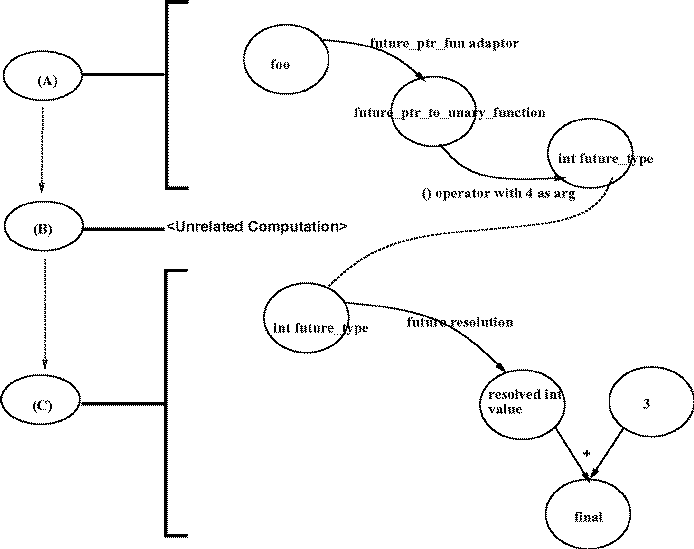




Next: Future-based Algorithms
Up: Computation Future Functor Adaptors
Previous: future_ptr_fun
The following piece of code is an example of how the user of this
library can use this facility. This code shows how a unary function
pointer can be 'adapted' to a future unary function object and used.
Suppose int (*foo)(int) is a unary function pointer that expects
an integer argument and returns an integer result.
It can be converted to a future unary function object and used as
follows:
future_pointer_to_unary_function<
int,int>::future_type fval
= (future_ptr_fun(foo))(4); // (A)
// do some unrelated work // (B)
int final = fval + 3; // (C)
The code executes as follows (see figure 2 for a
pictorial representation of the execution of this code):
-
In the statement labeled (A) the following sequence of
operations takes place:
The unary function pointer foo is converted into a future unary
function object with the use of the adaptor future_ptr_fun. Then the
operator '()' is invoked on the resultant future unary function object
with argument 4. This results in a task being scheduled to
compute foo
with argument 4 and a future handle is returned.
- In the statement(s) labeled (B) the user code can perform
computations that do not need the results of the foo function
described above.
- In the statement labeled (C) the result of the foo function is
required and the user code adds 3 to this result and assigns it to
final. Note that fval is of a future type while 3 is of type
int. Since + is only defined between similar types (and not between
future and int types) this statement would be valid only if there was
a way to go from the future type to its Result type (i.e., int
type). As mentioned before,
every future type has to provide a cast operator to its Result
type. In the implementation of the cast operator, the current thread
waits for the task corresponding to this future resolution to
finish and returns the value returned by the task.

Figure: The execution pattern
of the example given in page  : The statement labeled (A)
creates an int future object out of the foo function
pointer by first creating a
future_ptr_to_unary_function object using the future_ptr_fun
adaptor and schedules it with argument 4. Statement (B)
represents an unrelated computation. Statement (C) requires the
future to be resolved as a result of the addition operation
between the int future object and an integer constant 3 to
produce 'final'.
: The statement labeled (A)
creates an int future object out of the foo function
pointer by first creating a
future_ptr_to_unary_function object using the future_ptr_fun
adaptor and schedules it with argument 4. Statement (B)
represents an unrelated computation. Statement (C) requires the
future to be resolved as a result of the addition operation
between the int future object and an integer constant 3 to
produce 'final'.




Next: Future-based Algorithms
Up: Computation Future Functor Adaptors
Previous: future_ptr_fun
Sundaresan Neelakantan
Thu May 15 16:11:49 PDT 1997

 : The statement labeled (A)
creates an int future object out of the foo function
pointer by first creating a
future_ptr_to_unary_function object using the future_ptr_fun
adaptor and schedules it with argument 4. Statement (B)
represents an unrelated computation. Statement (C) requires the
future to be resolved as a result of the addition operation
between the int future object and an integer constant 3 to
produce 'final'.
: The statement labeled (A)
creates an int future object out of the foo function
pointer by first creating a
future_ptr_to_unary_function object using the future_ptr_fun
adaptor and schedules it with argument 4. Statement (B)
represents an unrelated computation. Statement (C) requires the
future to be resolved as a result of the addition operation
between the int future object and an integer constant 3 to
produce 'final'.
